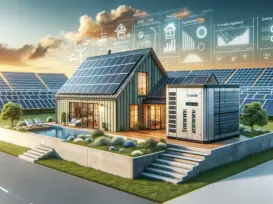Grus Home Energy - Enhancing Home Energy Efficiency
Maximizing Your Household's Green Potential: Tips for Boosting Home Energy Efficiency
Maximizing Your Household’s Green Potential: Tips for Boosting Home Energy Efficiency
In today’s eco-conscious world, enhancing home energy efficiency isn’t just beneficial for the environment—it’s also kind to your wallet. By adopting a series of smart habits and home improvements, you can significantly reduce your energy consumption, lower your utility bills, and contribute to a healthier planet. Here are several strategies to help you maximize your household’s energy efficiency.
First, consider conducting an energy audit. This assessment, often performed by professionals, can identify areas in your home where energy is being wasted. It may reveal inadequate insulation, drafts around windows and doors, or inefficient heating and cooling systems. By addressing these issues, you can tighten up your home’s energy use and make more informed decisions about potential upgrades or changes.
Investing in energy-efficient appliances is another powerful step. Look for products with the ENERGY STAR label, which signifies they meet energy efficiency guidelines set by the U.S. Environmental Protection Agency. While energy-efficient appliances might have a higher upfront cost, they often pay for themselves over time through lower energy bills.
Lighting is another area ripe for efficiency improvements. Switching to LED bulbs can significantly cut your energy consumption as they use at least 75% less energy than traditional incandescent bulbs. Plus, LEDs last much longer, so you’ll save money on replacements in the long run.
Proper insulation and sealing of your home are crucial for maintaining energy efficiency. Insulation helps keep your home warm in the winter and cool in the summer, reducing the need for excessive heating and cooling. Sealing gaps and cracks in windows and doors with weatherstripping or caulk can also prevent the loss of heated or cooled air.
Smart thermostats are a modern solution for energy savings. These devices can learn your schedule and adjust the heating and cooling of your home accordingly. Some models allow you to control your home’s temperature remotely via a smartphone app, ensuring you’re not wasting energy when you’re away.
Water heating can be a significant energy expenditure. To save energy, lower the temperature on your water heater to the warm setting (120°F). You can also install low-flow fixtures in your showers and sinks to reduce hot water use without sacrificing performance.
Another way to enhance home energy efficiency is by harnessing renewable energy sources. Solar panels, for instance, can provide clean, renewable energy to power your home, potentially reducing your electricity bill to zero. Many local governments offer incentives and rebates for homeowners who install solar panels, making this green investment even more attractive.
Landscaping can also play a role in energy efficiency. Planting trees or shrubs to provide shade on the sunny side of your home can reduce cooling costs in the summer. Similarly, using windbreaks can protect your home from cold winds in the winter, reducing heating demands.
Lastly, adopting energy-saving habits can have a considerable impact. Turn off lights when leaving a room, unplug electronics that aren’t in use, and only run dishwashers and washing machines with full loads. These small changes, when combined, can lead to substantial energy savings over time.
In conclusion, enhancing home energy efficiency is a multifaceted endeavor that requires a mix of technological upgrades, behavioral changes, and sometimes a modest investment. The benefits, however, are clear: lower utility bills, increased home comfort, and a reduced environmental footprint. By taking proactive steps today, you can ensure a greener, more efficient home for the future.
©2025 All Rights Reserved. Grus IoT Co.,Ltd.
